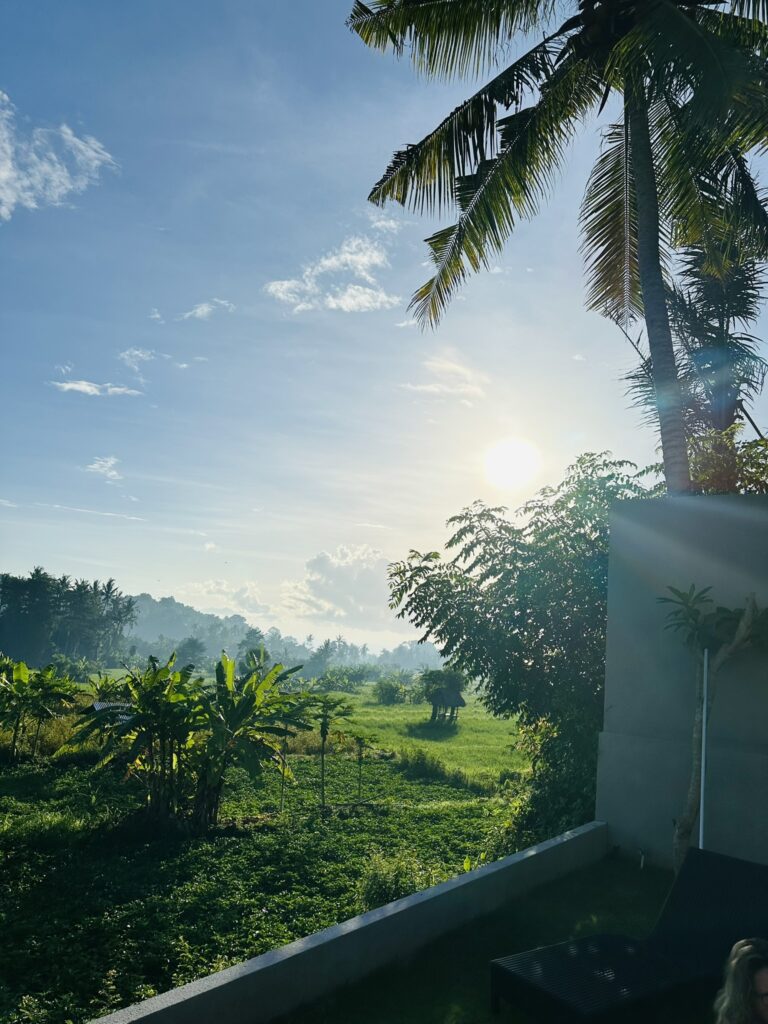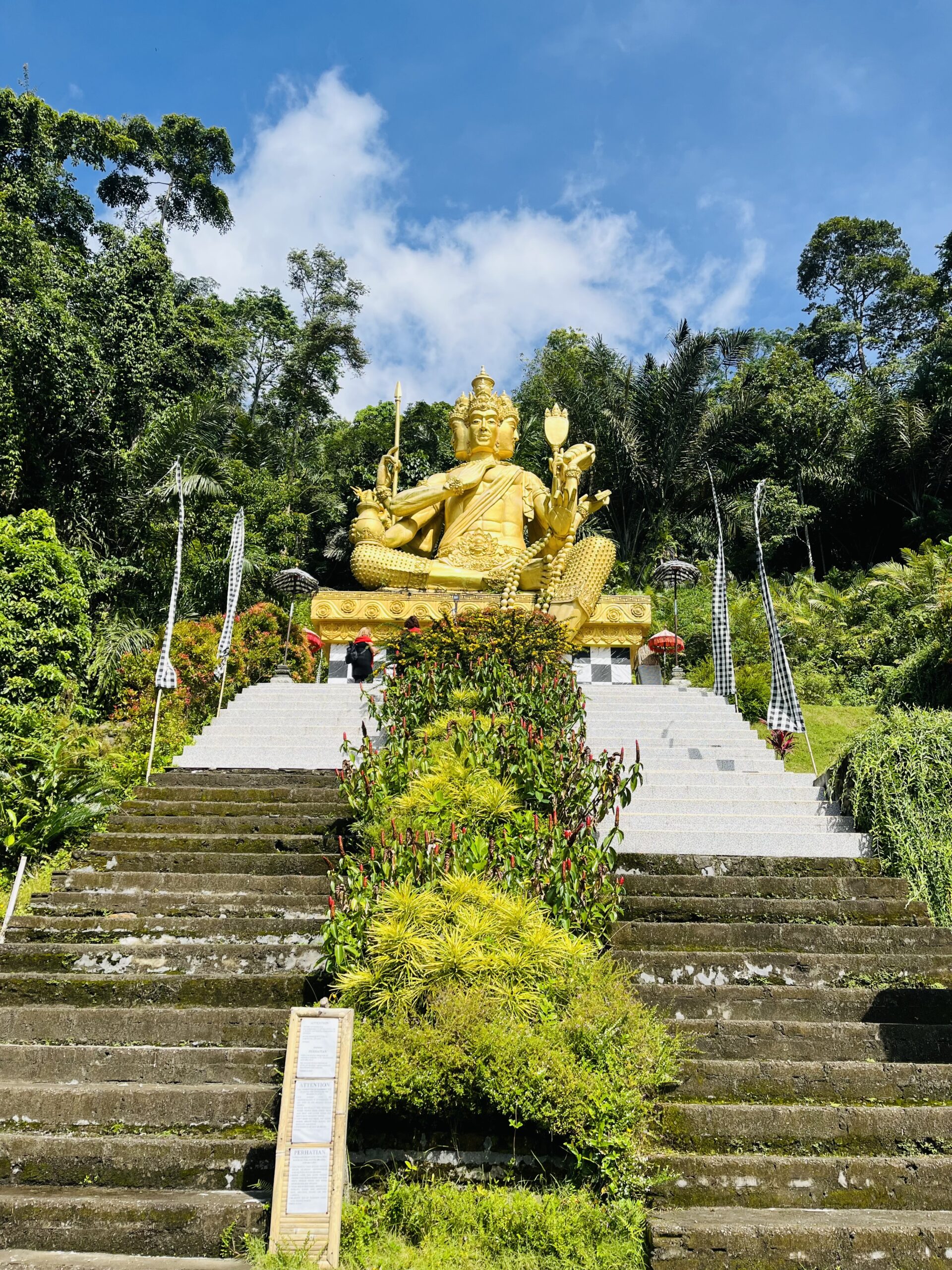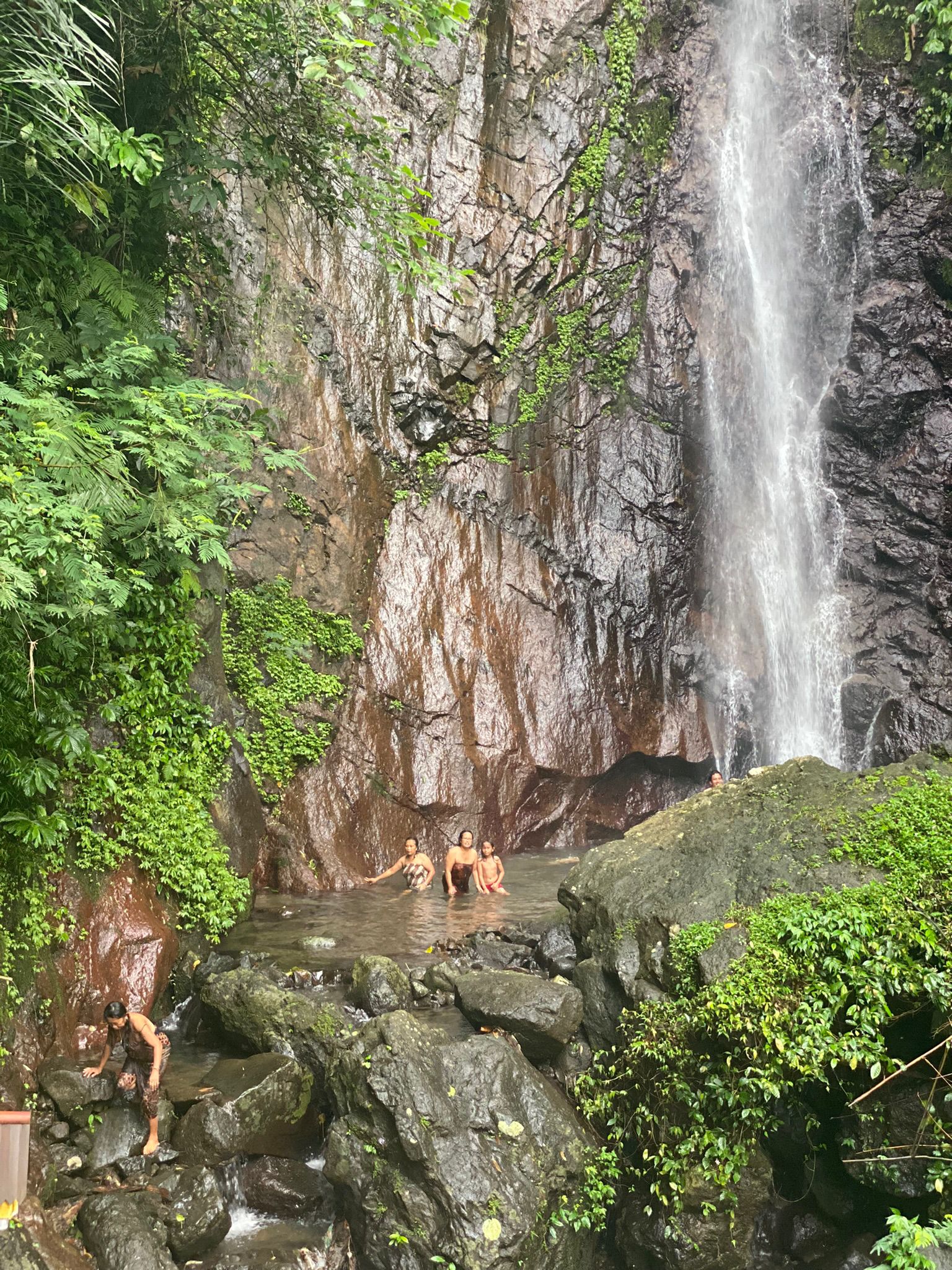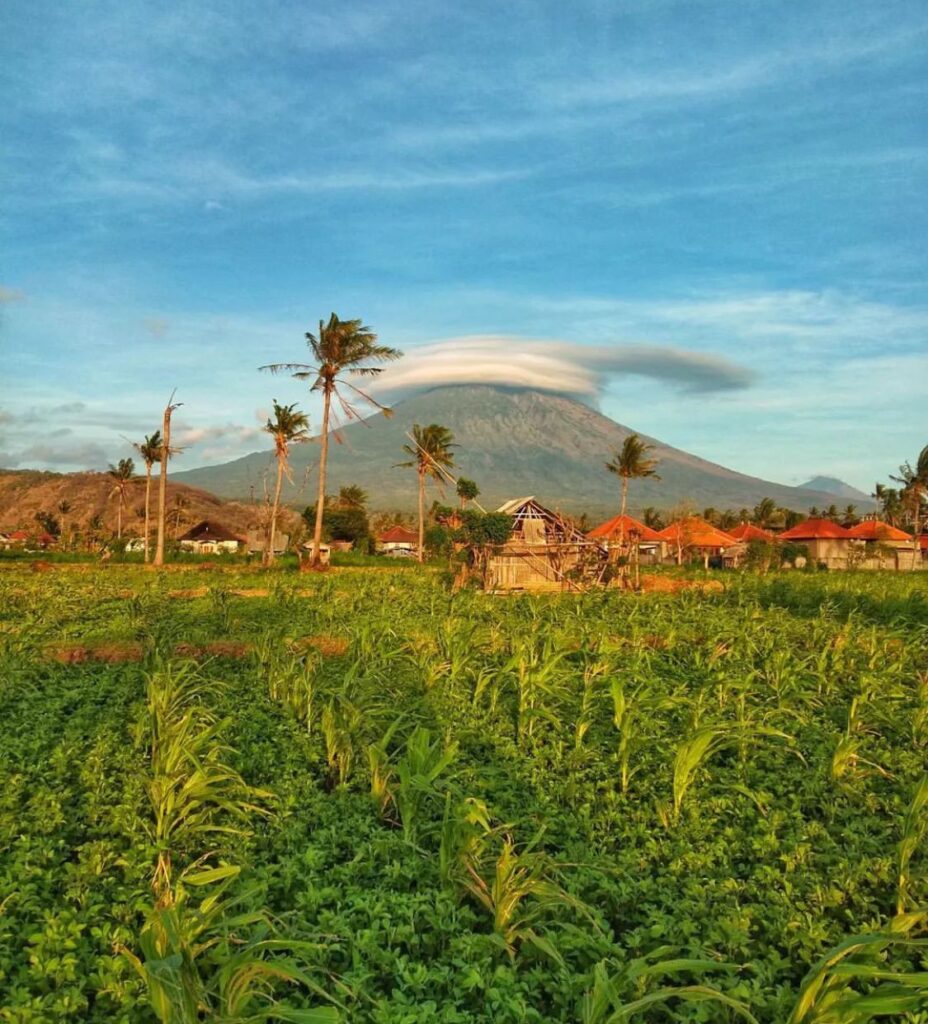Information
Practical Information
Weather and When to Travel
Bali enjoys a pleasant tropical climate all year round, with average temperatures between 26-32°C. The island has two main seasons – dry (April to October) and rainy (November to March). Even during the rainy season, however, it usually only rains for a few hours in the afternoon, and the rain brings a pleasant refreshment. The eastern part of the island, where our villas are located, enjoys milder rainfall than the south and west of Bali. The morning sunrises here are spectacular and the evening temperatures are pleasant for sitting outside. The waters of the Indian Ocean have a year-round temperature of around 27°C, which is ideal for swimming and water sports. You can expect the most consistent weather with minimal rainfall in July and August, making them the most popular months to visit, but each season has its own unique charm.

Weather and When to Travel
Bali enjoys a pleasant tropical climate all year round, with average temperatures between 26-32°C. The island has two main seasons – dry (April to October) and rainy (November to March). Even during the rainy season, however, it usually only rains for a few hours in the afternoon, and the rain brings a pleasant refreshment. The eastern part of the island, where our villas are located, enjoys milder rainfall than the south and west of Bali. The morning sunrises here are spectacular and the evening temperatures are pleasant for sitting outside. The waters of the Indian Ocean have a year-round temperature of around 27°C, which is ideal for swimming and water sports. You can expect the most consistent weather with minimal rainfall in July and August, making them the most popular months to visit, but each season has its own unique charm.

Visa and Documents
Entry conditions for Czech citizens to Bali
Visa and Documents
Entry conditions for Czech citizens to Bali
Visa on Arrival
- Mandatory for all visitors, can be handled online
- Price: 500,000 IDR (approx. 35 USD)
- Valid for 30 days with the possibility of extension for another 30 days
E-CUSTOMS DOCUMENTS (E-CD)
- Mandatory to fill out before arrival
- Filling online
- Must have a QR code upon arrival
TOURIST FEE
- A must for all visitors to Bali
- Price: IDR 150,000 (approx. USD 10)
- Payment online before arrival
- Must have a QR code upon arrival
ADDITIONAL REQUIREMENTS
- Filling out a health certificate here before boarding a flight to Bali
- Passport valid for at least 6 months after the planned return
- A return ticket or a ticket to the next destination
- Travel insurance (highly recommended)
Visa on Arrival
- Mandatory for all visitors, can be handled online
- Price: 500,000 IDR (approx. 35 USD)
- Valid for 30 days with the possibility of extension for another 30 days
E-CUSTOMS DOCUMENTS (E-CD)
- Mandatory to fill out before arrival
- Filling online
- Must have a QR code upon arrival
TOURIST FEE
- A must for all visitors to Bali
- Price: IDR 150,000 (approx. USD 10)
- Payment online before arrival
- Must have a QR code upon arrival
ADDITIONAL REQUIREMENTS
- Filling out a health certificate here before boarding a flight to Bali
- Passport valid for at least 6 months after the planned return
- A return ticket or a ticket to the next destination
- Travel insurance (highly recommended)

Local Customs and Etiquette
Bali is not only a tropical paradise, but above all a sacred island with a rich cultural tradition and specific customs that must be respected. When visiting temples, it is necessary to cover your shoulders and knees with a traditional sarong and sash (which are usually lent to you at the entrance), women during menstruation should refrain from visiting temples. The Balinese consider the head sacred, never touch it, as well as point your feet at anyone, which is considered offensive. Use your right hand when passing and receiving objects. Public displays of affection are not appropriate, as are overly revealing clothing off the beach. Locals appreciate it when visitors learn at least basic polite phrases in Indonesian and always smile – smiling is the universal language in Bali and the key to the hearts of the locals. When passing through a village during religious ceremonies, it is advisable to stop and wait for the procession to pass.
Local Customs and Etiquette
Bali is not only a tropical paradise, but above all a sacred island with a rich cultural tradition and specific customs that must be respected. When visiting temples, it is necessary to cover your shoulders and knees with a traditional sarong and sash (which are usually lent to you at the entrance), women during menstruation should refrain from visiting temples. The Balinese consider the head sacred, never touch it, as well as point your feet at anyone, which is considered offensive. Use your right hand when passing and receiving objects. Public displays of affection are not appropriate, as are overly revealing clothing off the beach. Locals appreciate it when visitors learn at least basic polite phrases in Indonesian and always smile – smiling is the universal language in Bali and the key to the hearts of the locals. When passing through a village during religious ceremonies, it is advisable to stop and wait for the procession to pass.

Bali Transportation
Transportation in Bali is a unique mix of adventure and flexibility. The most common mode of transportation is a scooter, which offers the greatest freedom of movement, but requires experience and maximum caution – local traffic rules are often governed by unwritten laws and traffic can be chaotic for Europeans. For longer trips or family trips, we recommend using the services of our experienced driver with an air-conditioned car who knows all the routes and local specifics. Alternatives are the apps Grab or Gojek (the local version of Uber), which offer both car and scooter transportation. When traveling around the island, expect longer time intervals – distances can be shorter, but heavy traffic, especially in the southern part of the island, can significantly prolong the journey. Around our villas in the eastern part, traffic is calmer and clearer. We also provide transfers from the airport for guests (the journey takes approximately 2.5 hours) and we can also arrange car rental with a driver for the entire stay.

Bali Transportation
Transportation in Bali is a unique mix of adventure and flexibility. The most common mode of transportation is a scooter, which offers the greatest freedom of movement, but requires experience and maximum caution – local traffic rules are often governed by unwritten laws and traffic can be chaotic for Europeans. For longer trips or family trips, we recommend using the services of our experienced driver with an air-conditioned car who knows all the routes and local specifics. Alternatives are the apps Grab or Gojek (the local version of Uber), which offer both car and scooter transportation. When traveling around the island, expect longer time intervals – distances can be shorter, but heavy traffic, especially in the southern part of the island, can significantly prolong the journey. Around our villas in the eastern part, traffic is calmer and clearer. We also provide transfers from the airport for guests (the journey takes approximately 2.5 hours) and we can also arrange car rental with a driver for the entire stay.


Safety
Bali is a safe tourist destination where violent crime is very rare. The locals are known for their friendly and peaceful nature, which stems from their Hindu faith. Nevertheless, we recommend following the basic safety rules – store valuables in the safe in the villa, put your backpack or purse between your legs (not over your shoulder) on your scooter, and be careful of small pickpockets when visiting busier tourist spots. The biggest risk is transportation, so always wear a helmet and pay extra caution when renting a scooter. You can feel completely safe in our villas in East Bali – the area is quiet, away from the main tourist traffic, and our team is available 24/7. We also recommend using quality travel insurance that will cover any medical complications or accidents. When swimming in the ocean, respect local rules and warnings about undercurrents, which can occur especially during periods of stronger waves.
Safety
Bali is a safe tourist destination where violent crime is very rare. The locals are known for their friendly and peaceful nature, which stems from their Hindu faith. Nevertheless, we recommend following the basic safety rules – store valuables in the safe in the villa, put your backpack or purse between your legs (not over your shoulder) on your scooter, and be careful of small pickpockets when visiting busier tourist spots. The biggest risk is transportation, so always wear a helmet and pay extra caution when renting a scooter. You can feel completely safe in our villas in East Bali – the area is quiet, away from the main tourist traffic, and our team is available 24/7. We also recommend using quality travel insurance that will cover any medical complications or accidents. When swimming in the ocean, respect local rules and warnings about undercurrents, which can occur especially during periods of stronger waves.

Healthcare and Vaccination
No vaccination is mandatory for the trip to Bali, however we recommend that you consult your doctor or visit a vaccination center. Vaccination against icterus type A and B, or typhoid, is commonly recommended. Quality healthcare is available on the island, especially at the private hospitals BIMC in Kuta and Siloam in Denpasar, which meet international standards. In the eastern part of Bali you will find smaller clinics for basic treatment. We recommend taking basic medicines (anti-diarrhea, pain, temperature, disinfection) and especially mosquito repellent with you. We strongly recommend using a high-quality travel insurance with sufficient coverage, which also includes possible transportation to the hospital or repatriation. Observe basic hygiene rules when consuming food and beverages – drink only bottled water, avoid ice from unverified sources and consumption of raw food from street stalls. If necessary, our team will help you arrange medical care and recommend proven medical facilities.

Healthcare and Vaccination
No vaccination is mandatory for the trip to Bali, however we recommend that you consult your doctor or visit a vaccination center. Vaccination against icterus type A and B, or typhoid, is commonly recommended. Quality healthcare is available on the island, especially at the private hospitals BIMC in Kuta and Siloam in Denpasar, which meet international standards. In the eastern part of Bali you will find smaller clinics for basic treatment. We recommend taking basic medicines (anti-diarrhea, pain, temperature, disinfection) and especially mosquito repellent with you. We strongly recommend using a high-quality travel insurance with sufficient coverage, which also includes possible transportation to the hospital or repatriation. Observe basic hygiene rules when consuming food and beverages – drink only bottled water, avoid ice from unverified sources and consumption of raw food from street stalls. If necessary, our team will help you arrange medical care and recommend proven medical facilities.

Subscribe to the newsletter and receive news and special offers.
+420 731 483 732 (Josef Brejžek – Bali)
+420 608 951 357 (Lukáš Kučera – ČR)
